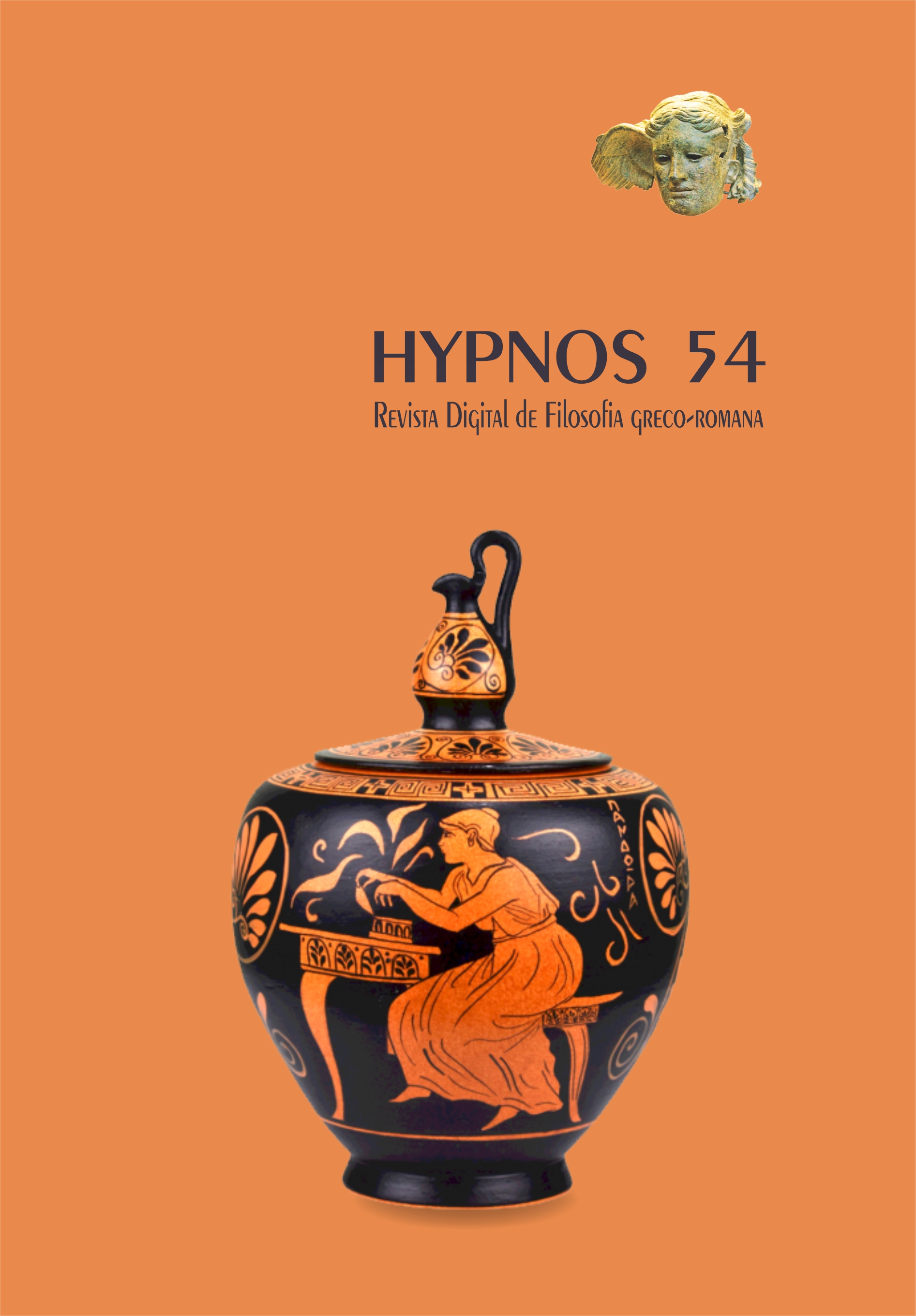Derecho natural sin ley natura: Tomás de Aquino y algunas diferencias importantes con Aristóteles
Palavras-chave:
Derecho, ley, naturaleza, Tomás de Aquino, AristótelesResumo
La idea de derecho natural tiene una antigua tradición que llega incluso hasta Aristóteles con su concepto de “lo justo por naturaleza”. Tomás de Aquino recoge esa idea y la enriquece con el aporte de los estoicos y, naturalmente, del cristianismo. Un papel central en esta noción de “lo justo por naturaleza” es, obviamente, la concepción de la naturaleza, que presenta muchas semejanzas en los dos pensadores. Hay sin embargo una diferencia importante y es la que permite hacer de la naturaleza aristotélica el referente último de “lo justo por naturaleza”. Para Tomás de Aquino en cambio, la naturaleza es un instrumento en las manos de Dios, con lo cual deja de ser el referente último de todo lo “natural”, incluido el derecho o lo justo. La noción de lo justo requiere de un criterio según el cual decimos que una cosa es justa, y a ese criterio Tomás de Aquino lo llama “ley”. En las cosas justas por naturaleza, esa ley es la razón de Dios, creadora de la naturaleza. Para Aristóteles en cambio, al tratarse de un dios que no es creador ni gobernador voluntario del mundo, la naturaleza no puede ser efecto de un acto creador, y por lo tanto se convierte en el referente último de legitimación de lo justo por naturaleza.
Referências
ARGÜELLO, Santiago. Tomás de Aquino, Aristóteles y la creación. Un enfoque desde la metafísica modal”. Cuadernos del Sur – Filosofía, 41, 2012, p. 46-70.
ARISTÓTELES. Acerca del alma. De anima. Traducción, notas, prólogo e introducción: Marcelo BOERI. Buenos Aires: Colihue, 2010.
ARISTÓTELES. Ética a Nicómaco. Edición bilingüe y traducción de María Araujo y Julián Marías. Introducción y notas de Julián Marías. Madrid: Centro de estudios constitucionales: 1970.
ARISTÓTELES. Metafísica. Edición trilingüe por Valentín García Yebra. Madrid: Editorial Gredos, 1998.
ARISTÓTELES. Política. Edición bilingüe y traducción por Julián MaríaS y María Araujo. Madrid: Centro de estudios constitucionales, 1983.
ARISTÓTELES. Retórica. Introducción, traducción y notas por Quintín Racionero. Madrid: Biblioteca clásica Gredos, 2022.
ARISTÓTELES. Tratados de lógica (Órganon), Vol. 1. Categorías, Tópicos, Refutaciones sofísticas. Introducción, traducción y notas de Miguel Candel Sanmartín. Madrid: Biblioteca clásica Gredos, 1982.
BAGNULO, Roberto. Il concetto di diritto naturale in San Tommaso d’Aquino. Milano: Giuffrè. 1983.
BERTI, Enrico: “The Relationship between Science, Religion and Aristotelian Theology Today”, en Science and the Future of Mankind. Science for Man and Man for Science. The Proceedings of the Preparatory Session 12-14 November 1999 and the Jubilee Plenary Session 10-13 November 2000. Pontificiae Academiae Scientiarum Scripta Varia. Ex Aedibus Academicis in Civitate Vaticana, <2001>, 228-234.
CARPINTERO BENÍTEZ, Francisco. Sobre la ley natural en Tomás de Aquino. Díkaion. Vol. 22, n. 2, 2013, p. 205-246.
DESTRÉE, Pierre. “Aristote et la question du droit naturel”. Phronesis XLV, Vol. 3 <2000>, 220-239.
FINNIS, John. Natural Law and Natural Rights. Oxford: Clarendon Press, 1986. Hay traducción al español de Cristóbal Orrego: Ley natural y derechos naturales. Buenos Aires: Abeledo Perrot. 2000 (Estudio preliminar y traducción a partir de la 6a edición de Oxford University Press).
GAUTHIER, René A.; JOLIF, Jean. Aristote. L’Éthique à Nicomaque. Louvain-Paris : Publications Universitaires – Béatrice- Nauwelaerts, 1970. Vol. II.
MACHIAVELLI, Nicolò. Il príncipe. Edizione del cinquecentennale con traduzione a fronte in italiano moderno di Carmine Donzelli. Introduzione e commento di Gabriele Pedullà. Roma: Donzelli editore: 2013.
MARSILIO DE PADUA. El defensor de la paz. Estudio preliminar, traducción y notas de Luis Martínez Gómez. Madrid: Editorial Tecnos, 1989.
MARTÍNEZ BARRERA, Jorge. El concepto tomista de naturaleza como propedéutica al estudio de la comunidad política: una herencia aristotélica. Scripta Mediaevalia, Vol. 15, N.1, 2022, p. 139-168. https://doi.org/10.48162/rev.35.013
THOMAE DE AQUINO. Opera Omnia. Recognovit et instruxit Enrique Alarcón automato electronico Pompaelone ad Universitatis Studiorum Navarrensis aedes a MM A.D. https://www.corpusthomisticum.org/iopera.html
TOMÁS DE AQUINO; PEDRO DE ALVERNIA. Comentario a la Política de Aristóteles. Traducción de Ana Mallea. Prólogo y notas de Ana Mallea y Celina Lértora. Navarra: EUNSA, 2001.
VILLEY, Michel. Le droit et les droits de l’homme. Paris: PUF, 1983.
Downloads
Publicado
Edição
Seção
Licença
Copyright (c) 2024 Revista Hypnos

Este trabalho está licenciado sob uma licença Creative Commons Attribution-NonCommercial-ShareAlike 4.0 International License.
O conteúdo dos manuscritos enviados é de responsabilidade exclusiva dos autores. Os textos devem ser originais. Caso tenham sido publicados em alguma revista não brasileira, o autor deve claramente indicar o nome, número e data da publicação e país. A editoria decidirá sobre o interesse em publicar na Hypnos.
O conteúdo dos manuscritos foi tácita ou explicitamente aprovada pela autoridades responsáveis onde se realizou a pesquisa.
Se aceito o manuscrito, o autor concorda em permitir sua publicação pela revista Hypnos, declinando de ganhos pecuniários decorrentes de direitos autorais. Caso o manuscrito venha a ser posteriormente publicado em outros meios, o autor concorda em fazer constar os créditos da primeira publicação na subsequente.
Caso o documento submetido inclua figuras, tabelas ou seções extensas de texto previamente publicados, o autor se declara responsável por ter obtido permissão dos detentores originais dos direitos autorais desses itens, tanto para a publicação em linha quanto impressa desta revista. Todo material com direitos autorais deve ter créditos adequadamente atribuídos no manuscrito.


 A revista
A revista 